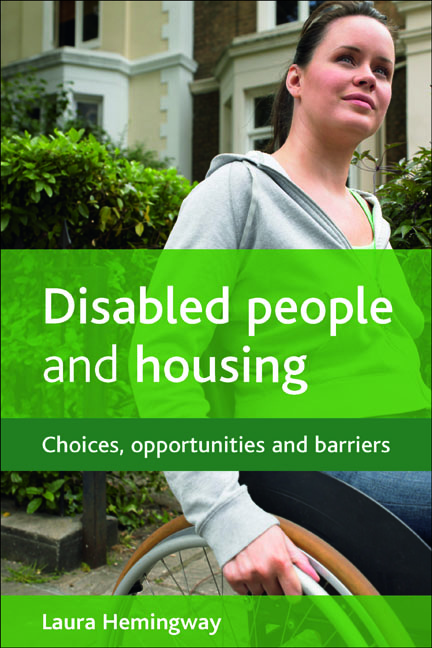Book contents
- Frontmatter
- Dedication
- Contents
- Acknowledgements
- one Introduction
- two Housing policy and disabled people: from past to present
- three Understanding disability: from ‘personal tragedy’ to social disadvantage
- four Physical and communication barriers: the built environment and access to information
- five Financial considerations: income, affordability and risk assessment
- six Attitudinal constraints: assumptions and institutional practices
- seven Creating the ‘home’ in a society of barriers
- References
- Websites
- Index
six - Attitudinal constraints: assumptions and institutional practices
Published online by Cambridge University Press: 07 September 2022
- Frontmatter
- Dedication
- Contents
- Acknowledgements
- one Introduction
- two Housing policy and disabled people: from past to present
- three Understanding disability: from ‘personal tragedy’ to social disadvantage
- four Physical and communication barriers: the built environment and access to information
- five Financial considerations: income, affordability and risk assessment
- six Attitudinal constraints: assumptions and institutional practices
- seven Creating the ‘home’ in a society of barriers
- References
- Websites
- Index
Summary
Attitudes and assumptions held by housing providers and institutions can be just as ‘disabling’ as the physical and economic environment, and it is these that form the focus of this chapter. While the ‘disabling’ nature of attitudes in general have been discussed elsewhere in detail (Wolfensberger, 1972; Finkelstein, 1980; Barnes, 1991; Swain and Lawrence, 1994), here we consider the impact that attitudinal factors can have on disabled people's opportunities within housing. These attitudinal considerations are taken in a broad sense to include the attitudes, assumptions and stereotypes held by a range of different ‘actors’ about disabled people and their needs, encompassing individual perspectives as well as institutions at a wider level. Thus, the label refers loosely to the role played by individuals within housing services and organisations, as well as to the regulations and policies that guide individuals’ actions towards disabled people.
While attitudes would seem to reflect individual biases and prejudice (and thus are an effect of ‘agency’), they are often influenced and formed by structural factors or social processes and cultures. Housing policymakers, providers and professionals’ ideas, knowledge and understanding of disability are influenced by the assumptions and stereotypes held by society in general, as are institutional practices. As a result, the policy discourse of community care (Clapham, 2005) and the dominant perception of disability play a significant role. As we have seen, the latter has largely reflected a more individual or ‘medical’ interpretation of disability. Here, disabled people have been cast in the role of passive recipients of services; as dependent and in need of care; as disadvantaged by their impairment, rather than wider social processes; and as different, with needs that can be considered ‘special’ and thus requiring separate forms of provision to the rest of the population. People with particular impairments, such as people labelled with learning difficulties, also have to contend with assumptions made in relation to their capacity to make decisions about their housing (Morris, 2004; McGlaughlin et al, 2004; Bowey et al, 2005).
- Type
- Chapter
- Information
- Disabled People and HousingChoices, Opportunities and Barriers, pp. 129 - 156Publisher: Bristol University PressPrint publication year: 2011



